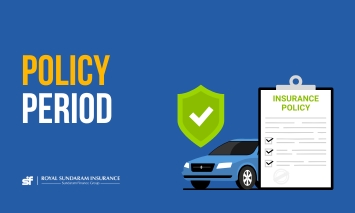Comprehensive vs Third Party Car Insurance - Key Differences
Mar 31, 2025 • 15 Min Read
According to the Motor Vehicles Act, when you buy a car, it's mandatory to get car insurance as well. But do you know how many types of car insurance are available?
Basically, two of the most common types are comprehensive insurance and third-party insurance.
Both serve different purposes and offer varying levels of protection, so understanding the difference between comprehensive vs third-party car insurance is vital to make the right choice.
What is Comprehensive Car Insurance?
As the name suggests, comprehensive car insurance offers comprehensive coverage. It protects not only against third-party liabilities but also against damages to your own vehicle due to accidents, theft, fire, natural disasters (like floods or earthquakes), etc.
Benefits of Buying a Comprehensive Car Insurance
- Protects Your Car in Different Situations: Comprehensive insurance protects your car from risks, such as accidents, including fire, theft, riots, or natural calamities.
- Offers Add-On Options: You can customise the base policy by selecting add-ons, such as roadside assistance, zero depreciation, engine protection, etc., to ensure enhanced protection for your car.
- Protection Against Theft: If your car is stolen, comprehensive insurance will provide you with the Insured declared Value (IDV) to cover the cost of replacing it. Without this coverage, you would have to bear the entire financial loss yourself.
- No Claim Bonus: The insurer will give a "No Claim Bonus" as a reward to the policyholders who don’t make any claims during the policy year.
Exclusions of Comprehensive Car Insurance
Comprehensive Car Insurance is not liable for any coverage under the below circumstances:
- Driving under the influence of alcohol or drugs
- If the vehicle is involved in any illegal or fraudulent activities
- Intentionally damage
- Regular car wear and tear
- Over time, the value of your car decreases due to depreciation. Comprehensive insurance doesn’t cover this loss in value.
- If you are not paying for a particular add-on, you can't claim the coverage as well.
What is a Third-Party Car Insurance?
Third-party car insurance is the most basic and legally required form of car insurance. Without this, it's illegal to drive a car on Indian roads. It covers you against liabilities towards a third party in case of an accident. This includes injuries or damages to the third party's vehicle, property, or person. However, it does not cover any damage to your own vehicle.
Let’s say you accidentally bump into another car while parking. Your third-party insurance will pay for the damage to the other car, but you’ll have to pay to fix your car.
Benefits of Buying a Third-Party Car Insurance
If an accident happens due to your car, third-party insurance will cover the costs for damages or injuries to other people involved. This includes repairing costs and paying for their medical expenses if they’re hurt.
Exclusions of Third-Party Car Insurance
Third-Party Car Insurance is not liable for any coverage under the below circumstances:
- Any damage caused to your own car
- No coverage for natural disasters and theft
In a nutshell, the difference between third-party and comprehensive car insurance is that third-party only offers coverage for third-party liabilities, while comprehensive insurance's scope of coverage is wider.
Difference Between Third-Party Car Insurance and Comprehensive Car Insurance
| Parameter | Comprehensive Car Insurance | Third-Party Car Insurance |
|---|---|---|
| Definition | Extensive insurance covering damages to third parties as well as your own vehicle. | Basic insurance that covers damages to third parties in case of an accident. |
| Legal requirement | Not Mandatory, but recommended for full car protection | Mandatory |
| Coverage | Covers both third-party damages and own vehicle damages (including accidents, theft, natural disasters, fire, etc.) | Covers damages to third parties (other vehicles, property, or people) |
| Add-on coverages availability | Offers multiple add-ons like zero depreciation, engine protection, roadside assistance, etc. | No add-ons available |
| Flexibility | Highly flexible with options to customise the policy. | Less flexible, limited to basic coverage |
| Premium Costs | Higher due to comprehensive protection | Cheaper due to limited coverage |
| Risk protection | Provides extensive protection for a variety of risks, including your vehicle. | Provides basic protection, only for third-party liabilities. |
Which One Should You Choose: Third-Party Car Insurance or Comprehensive Car Insurance?
If we talk about which one to choose between, comprehensive vs third-party car insurance, then the answer is pretty obvious.
As already said above, getting third-party car insurance is mandatory, so there is no choice on this one. But for comprehensive car insurance, it entirely depends on the owner if they want to invest in the same.
Let's understand it.
1. Cost Considerations
Third-party insurance is cheaper. It's a good option if you're on a tight budget. Comprehensive insurance costs more. However, it can save you money in the long run if you need to make a claim.
2. Customisation Options
Comprehensive insurance offers add-ons. These can include zero depreciation and roadside assistance. Third-party insurance doesn't have these options. It's a fixed package with no room for customization.
3. Risk Assessment
Think about your driving habits and environment. Do you live in an area prone to natural disasters? Comprehensive might be wise. Do you rarely drive? Third-party could be sufficient.
4. Legal Requirements
Remember, third-party insurance is the legal minimum. You must have at least this level of coverage. Comprehensive is optional but recommended for fuller protection.
Overall, comprehensive car insurance is best for those who want full protection for their car. For instance, while driving another car collides with your car and both vehicles sustain damages. With comprehensive insurance, your policy will cover the cost of repairing your car along with third-party damage caused by the car. But if you only have third-party car insurance, you are the one responsible for all the repair costs of your car.
Conclusion
While choosing between comprehensive vs third-party car insurance, think about the value of your car, how much risk you’re willing to take, and your budget.
If you are okay with basic coverage and lower costs, third-party insurance is suitable. On the other hand, if you want full protection, comprehensive car insurance is the best choice on any day.
In the end, consider all factors when choosing between comprehensive vs 3rd party insurance. Make an informed decision that gives you the right balance of protection and affordability. Your peace of mind on the road depends on it!



Discover the perfect insurance plan for you!
Get your free quote now!
Get StartedBy Clicking on Get Started, You agree to our Terms and Conditions and override DNC/NDNC registration.
More like this
View more





.png)